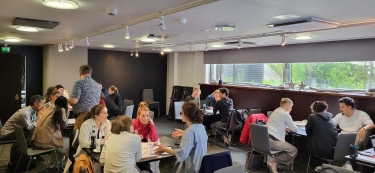2018 EFIPLANT & IEFC Annual Meeting
This year’s event marked the official transition of what was EFIATLANTIC (the Atlantic Regional Office of the European Forest Institute) to the Planted Forests Facility. The concept of a facility is in line with the work initiated by the regional office, and before that the IEFC project centre, aiming at proximity with end users.
Network members were invited to participate in the open forum which kicked off the meeting and was followed by the business session in which ongoing and future activities were presented (see online presentations).
During the business session, the audience was given a comprehensive overview of the work achieved in 2018 and the work planned for the future in the context of the above aims, thus fulfilling the expectations of the new EFI strategy. Options for a new acronym for the facility were also explored in an open consultation with the audience, finally settling for EFIPLANT.
In addition, 2018 celebrated 20 years of the European Institute of Planted Forests (IEFC), paying homage to its past presidents and a generation having actively contributed to the network and looking forward to its future role alongside the Planted Forest Facility. USSE acknowledged all the work achieved during the 20 years and passed on messages about the current research needs from a forest owner perspective.
Furthermore, new board members were elected, including many new faces, and Nick Mc Carthy from the Waterford Institut of Technology was elected as president for the next four-year term. This celebration was also an opportunity to launch an updated version of the 18 year-old IEFC website, and to publish a booklet giving a snapshot of the 20 years of networking activities.
The scientific seminar on the theme of Global Change and Associated Risks explored trends in Europe and improvement for preparedness in the planted forests of southern Europe. Forest fire had a dramatic impact on Portuguese forests in 2017, the nematode is likely to spread even further as a result of climate change, and infestations of eucalyptus weevil have a huge economic impact given the increasing importance of Eucalyptus in Portugal’s economy. The scientific seminar therefore provided an opportunity to address these issues, as well as to provide an overview of European initiatives which aim to mitigate these risks and of the improvement of the different risk management plans proposed within the PLURIFOR project.
We learnt that the trend is leading to an increase in risk pressure on forests and that even if it is possible for active management to increase the preparedness of planted forests, the situation will be complicated by new specific weather conditions induced by climate change and an increase in pest introduction as a result of world trade.
The annual meeting was rounded off with a field trip which took the participants northwards on an exploration of different planted forests (pine and eucalyptus) illustrating the management of risks discussed in the seminar and showing the extent of last year’s fires. There was also a visit to a site on the border between northern Portugal and Spain which is intensively monitored for Pine wood nematode.
Over the course of the three days, more than 80 participants from 14 countries and diverse organisation including research centres, international organisations, industries, forest owner associations and local authorities joined the event.
We are grateful to ISA, USSE and FORESTIS for their support in the organisation of this event.
Programmes
Open and Business session agenda
Scientific Seminar programme:
Presentations
Open Session (26 June)
- Form over function? Aesthetic drivers of forest management. Jakob Derks (EFI)
- New Zealand Forest Programme "1 Billion Trees". Jean Michel Carnus (IEFC)
- The EU forest strategy: midterm evaluation by French stakeholders. Roland De-Lary (CRPF)
- Rosewood: consortium of EU experts for wood mobilisation. Roland De-Lary
- Use of fire simulators in forest management; the case of the Basque Country. Alejandro Cantero (HAZI)
- Increasing resilience in Scottish planted forest. Bruce Nicoll (Forest Research)
- NET RISK WORK project. Eduard Plana (CTFC)
- Necesidades en I+D de los propietarios forestales (Francisco Fernández de Ana Magán, President of the Asociación Forestal de Galicia)
Scientific Seminar on Global Change and Associated Risks





